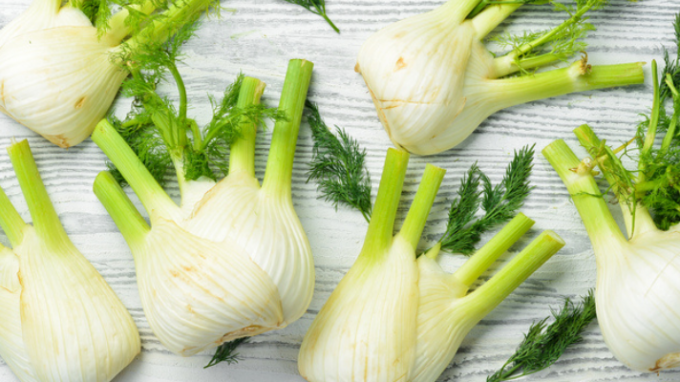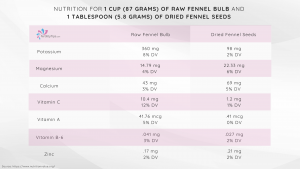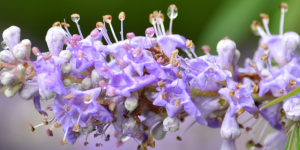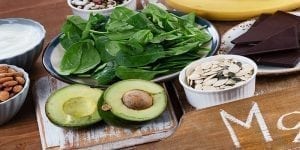For those individuals who love a strong taste or are a fan of black licorice, fennel is undoubtedly a favorite seasoning, but the benefits go beyond its anise flavor index. In fact, fennel is an herb that has been used for centuries to treat various health problems. In addition to its benefits when it comes to digestion and weight management support, it is believed that the chemicals in fennel can also help improve fertility and reproductive health.
The Nutrient Benefits Within Fennel
This bulb-like looking vegetable can be found in a variety of forms, from its full vegetable form to dried herbs leaves, seeds or infused oil.
For women, the health benefits of fennel are primarily tied to its oil. A study, published in the “Journal of Menopausal Medicine”, reviewed the benefits of fennel oil specifically when used to manage painful menstruation, premenstrual syndrome, missing periods, menopause, lactation, and polycystic ovary syndrome (PCOS), and found that in some cases, symptoms and severity of conditions improved.
When it comes to nutritional value, fennel is a great source of vitamins and minerals including potassium, magnesium, calcium, vitamin C, vitamin A, and vitamin B. It also contains two types of phytonutrients called anethole and fenchone. These chemicals and nutrients, when looked at individually, all play a crucial role in the herb’s fertility-enhancing effects.
-
Potassium: Potassium is an important mineral for overall health, including reproductive health. It helps to regulate blood pressure and fluid balance and promotes nerve and muscle function. A study published in the journal “Food and Chemical Toxicology” also found that potassium supplementation improved reproductive function in female mice.
- Magnesium: Another important mineral for fertility is magnesium, by helping maintain healthy hormone levels and supporting women’s uterine health. Magnesium also plays a role in energy production and protein synthesis.
- Calcium: Known as an essential nutrient for strong bones and teeth, calcium is also necessary for a healthy pregnancy once conception takes place by helping to regulate uterus contractions, which can be helpful during labor.
- Vitamin C: Vitamin C, or ascorbic acid, plays a vital role in producing progesterone and estrogen. It is also responsible for the healthy development of blood vessels, essential to nourish an embryo as it grows into a baby during pregnancy.
- Vitamin A: This vitamin helps with fetal growth and supports immune function. It is important to get enough vitamin A when trying to conceive because it helps protect against congenital disabilities such as cleft lip or palate that can occur if not enough nutrients are present before conception occurs (prenatally). In addition, some studies show that higher intakes of folic acid may reduce risks related to neural tube defects like spina bifida by up to 70 percent.
- Vitamin B6: B vitamins all have their role in fertility health, but vitamin B-six in particular plays a vital role in producing progesterone and estrogen. It is also responsible for the healthy development of blood vessels, essential to nourish an embryo as it grows into a baby during pregnancy.
- Zinc: Zinc helps regulate hormonal functions that balance and regulate ovulation. Studies show that zinc is a critical component in processes that regulate female germ cell growth, fertility, and pregnancy and is necessary for the oocyte to form a fertilization-competent egg.
- Anethole: Estrogen is a hormone that is important for reproduction and fertility, and anethole has been shown to have estrogenic effects that play a dominant role in regulating the female reproductive cycle.
- Fenchone: Inflammation can interfere with reproductive health and ovulation. Fenchone’s anti-inflammatory properties allow women to have a higher chance for conception and successful pregnancy.
Using Fennel for Fertility
There are a few different ways to use fennel to improve fertility health. One way is to drink it as a tea. You can buy fennel seeds or tea bags containing the herb at most health food or grocery stores or online. Like many herbs, there are also supplemental options if a specialist or doctor recommends.
Fennel can most easily be incorporated into recipes. Try adding it to soups, salads, or yogurt treats. Some people also incorporate the seeds into a smoothie or protein bowl or herbal blend for daily consumption.
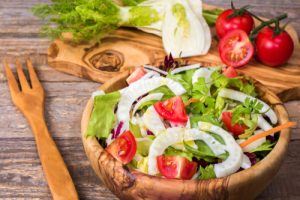
- 1 chicken breast, filleted and chopped up
- ¼ C black olives, chopped
- 2/3 C cherry tomatoes, halved
- 2 Tbs basil leaves, chopped
- 1 fennel bulb, quartered
- 2 Tbs olive oil
- 1 C baby spinach leaves
Directions:
- Heat a skillet or frying pan with a little olive oil. Fillet the chicken breast in half, widthwise to thin them out and cut into smaller pieces.
- Season the chicken with a little sea salt and pepper to taste. Grill the chicken in the pan for about 5 minutes on each side, or until they are cooked through. Add the tomatoes and fennel to the pan and cook until tender.
- Meanwhile, finely chop the olives and place them in a bowl with the basil, parsley and olive oil. Stir to combine to form a chunky dressing.
- On your serving dish, plate the baby spinach, top it with the chicken and grilled vegetables. Drizzle the olive dressing over the top and enjoy.
Ingredients:
- 1 apple, cored and chopped
- 1 C fennel slices, chopped
- 1 C frozen berries
- 1-2 C baby spinach leaves
- ½ C plain yoghurt
- 1 C oat milk or other non-dairy milk
Directions:
- Layer all ingredients into a blender, starting with the apple and fennel, ending with the yogurt and oat milk.
- Blend on high until the mixture is completely smooth.
- Pour into a glass, and serve immediately.
Ingredients:
- 1 medium sweet potato, washed and ends trimmed
- 3 beets, washed and trimmed
- 1 medium-large shallot (about 1/2 cup thinly sliced)
- 3 carrots, washed and trimmed
- 1/4 C + 2 Tbsp olive oil
- 1 tsp coriander seeds
- 1 tsp fennel seeds
- 1/2 tsp ground cumin
- 1 tsp sea salt
- 1/4 tsp ground black pepper
For Sauce:
- 1/3 C Greek yogurt
- 3 Tbsp fresh orange juice (about 1/2 orange)
- 1 Tbsp lemon juice (about 1/2 small lemon)
- 1/4 C minced fennel
- 1 Tbsp fennel frond
- Sprinkle sea salt, to taste
- Drizzle olive oil, to taste
- 1/3 C hazelnuts, roughly chopped
Directions:
- Preheat oven to 425ºF. Line a large baking sheet with parchment paper.
- Slice beets into sixths. Slice sweet potato into similarly sized wedges. Slice carrots into long juliennes, about 1/4” thick. Peel and thinly slice the shallot.
- Use a spice grinder or mortar and pestle to grind the coriander and fennel seeds to a coarse, powdery consistency (or to your desired texture).
- Place all sliced veggies in a glass bowl and drizzle with olive oil, and sprinkle with ground coriander and fennel seeds, ground cumin, sea salt, and black pepper. Toss to coat evenly and spread out on parchment paper in a single layer.
- Roast veggies for 30-35 minutes, rotating pan and turning over veggies with a spatula halfway through. Remove once all veggies are tender and beginning to brown at the edges.
- While the veggies roast, mix yogurt, orange and lemon juice, minced fennel, fennel frond, sprinkle of sea salt, and a drizzle of olive oil in a small bowl. Set aside.
- Place chopped hazelnuts on a small baking sheet and place in oven for 2-3 minutes. Remove when they are fragrant and just beginning to turn golden brown.
- Distribute roasted veggies to individual bowls, and top with citrus fennel yogurt and roasted hazelnuts.
For a quick on the go additive to water, create this herbal blend and use as desired.
Ingredients:
- 6 Tbsp ground Cumin
- 6 Tbsp ground Clove
- 6 Tbsp ground Fennel seeds
- 6 Tbsp ground black pepper
- 6 Tbsp whole cress seeds
- 3 tsp ground Fenugreek seeds
Directions to Use:
- Mix all the ingredients together and place in an airtight jar. To use, add ONE Tbsp of the herbal blend after breakfast and mix it into a 16oz glass of water with some honey to taste.
- Drink one full glass of water afterward to help flush the herbs through the system and increase hydration.
Finally, you can also add fennel essential oil to your bath water or massage it into the skin with a carrier oil such as coconut oil. Always remember to test for skin allergies and sensitivities before using the fennel essential oil.
Ingredients:
- 2 drops Fennel essential oil
- 3 drops Juniper essential oil
- 3 drops Lemon essential oil
Directions to Use:
- Add essential oils to warm running bath water. Sit back, relax, and breathe in the aromatherapy.
Ingredients:
- 3 tsp Fennel Seed
- 1 ½ C Raw Sugar
- ¾ C Sweet Almond, or Apricot Oil
- 5 drops Patchouli essential oil
- 6 drops Ylang-Ylang essential oil
- 20 drops Mandarin essential oil
Directions to Use:
- Grind the fennel seeds lightly in a mortar and pestle.
- Mix ground fennel seeds with sugar into a bowl. Place the apricot or almond oil in a jug or jag and add the additional essential oils. Stir through and add to the sugar and fennel mix.
- Use this scrub in the bath or shower by massaging into skin in a circular motion. Rinse off and enjoy the silky, luxurious effect on skin and enjoy the aromatherapy effects.
Due to the estrogenic properties of fennel, it is advised to seek input on dosage and use recommendations from a doctor or holistic specialist prior to incorporating this item into a fertility, preconception or prenatal diet.
